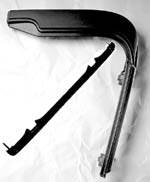Automotive
Fuel Cells Jolt Plastics Innovation
Optimists view fuel-cell vehicles and power appliances as a coming bonanza for plastics processors. They see potential demand for billions of pounds of thermosets and engineering thermoplastics in plates, membranes, manifolds, pumps, plumbing, and more. But molding challenges and cost hurdles mean success won’t come easily.
Read MoreNanocomposites Broaden Roles in Automotive, Barrier Packaging
Nanocomposites are gradually gaining acceptance in the mainstream of global plastics processing. These polymer compounds, containing relatively low loadings (under 6% by weight) of nanometer-sized mineral particles, are beginning to show up in polypropylene and TPO-based automotive exterior claddings, barrier beer bottles, nylon packaging films, polyethylene pipe and wire/cable coatings, and more.
Read MoreIn-Line Compounding of Long-Glass/PP Gains Strength in Automotive Molding
Another approach to long-fiber thermoplastic (LFT) molding is gaining credibility for producing a range of structural and semi-structural automotive parts. It is called direct LFT processing, and is already widely practiced in Europe.
Read MoreNew Polypropylene/PPO Alloys Fill a Cost/Performance Gap
A brand-new family of thermoplastics for automotive and other markets offers an intermediate range of cost and performance between those of TPOs and engineering resins such as nylon, ABS, long-glass PP, and some modified PET and PBT materials. GE Plastics, Pittsfield, Mass., has broadened its Noryl range of PPO alloys by adopting a new matrix material: polypropylene. New patent-pending technology allows the incompatible PP and PPO materials to be blended so as to create new balances of stiffness, toughness, and heat resistance in a moderate price range. Initial Noryl PPX grades are priced between $1.20 and 1.80/lb.
Read MoreCommingled Plastic Waste: New Gold Mine for Automotive Processors
Instead of going to landfills, previously unusable mixed waste like auto shredder residue is yielding a new trove of inexpensive engineering resins for car parts. Sortation technologies derived from the mining industry can pull out usable ABS, PC, acrylic, PP, TPO, and PPO alloys.
Read MoreNew Software Makes 3D CAD Easier To Learn, Use and Afford
You can now can leapfrog the previous obstacles of cost, complexity, and a long learning curve.
Read MoreNatural Fibers: The New Fashion In Automotive Plastics
Lightweight, strong, and low-cost, natural fibers are poised to replace glass and mineral fillers in numerous interior parts.
Read MoreMicrocellular Foam Promises Big Savings in Injection Molding
Automotive parts supplier Injectronics Inc. in Clinton, Mass., will soon be the first injection molder to use a new microcellular foam technology developed by Trexel Inc., Woburn, Mass.
Read MoreTPO and PP Advances Benefit Auto Parts and Food Packaging
Polypropylene and PP-based TPO elastomers were the star players of two recent conferences on polyolefins. "TPOs in Automotive '98," sponsored by Executive Conference Management, Plymouth, Mich., featured the latest materials, modifiers, and stabilizer additives for hard and soft interior and exterior automotive applications. "SPO '98," sponsored by Schotland Business Research, Inc., Skillman, N.J., highlighted developments in high-flow PP for thin-wall injection molded packaging.
Read More













